All Thyroid Patients Need Zinc
This a bold statement but one that I think you will come to agree with as you read this article.
Zinc, in my opinion, is one of the single most important nutrients for thyroid function.
And, unfortunately, there is a large group of people who are simply not getting enough of it.
Zinc deficiency leads to a number of very important thyroid-related issues which can be treated by focusing on zinc supplementation or by increasing zinc consumption through the diet!
To give you an idea of how important zinc is, consider that low levels of zinc can cause hypothyroidism (1).
Zinc is so important for thyroid function that elderly people who are zinc deficient develop full-blown hypothyroidism.
The good news is that this condition is easily fixed with zinc supplementation.
The bad news is that a great many people are zinc deficient, especially those with low thyroid function or hypothyroidism, and probably don’t even realize it.
Let’s talk about the importance of zinc, how to know if you are zinc deficient, how to fix the problem, and more.
Benefits of Zinc on Thyroid Function
The benefits of zinc on thyroid function are widespread but I’ve boiled it down into 3 very important areas.
These areas, in my opinion, play the biggest role in thyroid FUNCTION and explain why thyroid patients who are zinc deficient feel poorly.
Zinc, of course, plays other important roles in the body but we are going to focus primarily on how it impacts thyroid function:
#1. Zinc is Required for T4 to T3 Conversion
The first, and definitely most important function of zinc, is its role in something called T4 to T3 conversion.
This conversion process, also referred to as peripheral thyroid conversion, is the process by which your body takes the inactive thyroid hormone T4 and turns it into the active thyroid hormone T3.
The only function more important than this, as it relates to thyroid function, is the direct production of T3 from your thyroid gland.
Why?
If you don’t get enough T3 in your body you will simply NOT feel better.
And this is why so many people who take T4-only thyroid medications such as levothyroxine and Synthroid are not feeling optimal.
You can take all of the thyroid medication by mouth that you want but if your body isn’t activating or converting it then you won’t feel better.
Zinc is one of only a few major players which heavily influences this conversion process.
Low zinc levels result in decreased T4 to T3 conversion and therefore the symptoms of hypothyroidism.
As I mentioned earlier, this connection is so strong that elderly people who are zinc deficient develop full-blown hypothyroidism with low T3 levels.
Zinc is not the only nutrient involved in T4 to T3 conversion, though, but it is one of the most important.
Zinc deficiency will absolutely impact your ability to create T3 in a negative way and may be responsible for low thyroid function in many thyroid patients.
#2. Zinc is Also Required for Immune Function
Zinc is also required for optimal immune function (2).
You may not think this is important but let me explain to you why it matters for all thyroid patients.
You probably know that your immune system is the thing that helps you recover from illness, viral infections, and bacterial infections.
You probably already know that.
But what you may not realize is that your immune system is also the thing that must be working properly to prevent autoimmune diseases.
Autoimmune diseases are disease states in which your own body attacks and destroys organs and tissues.
What does this have to do with your thyroid?
Well, the number one cause of hypothyroidism and low thyroid function in the United States (3) and developed countries is Hashimoto’s thyroiditis.
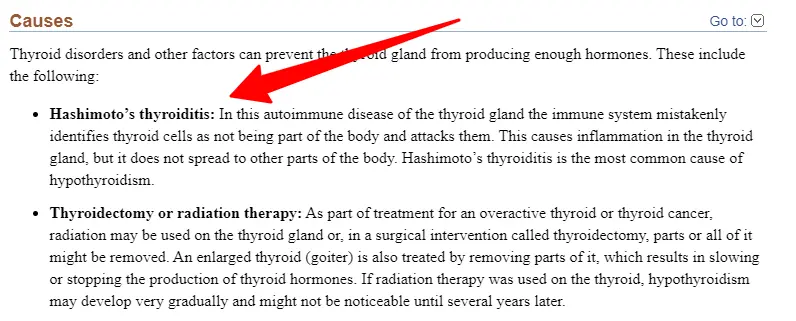
And, as you probably might have guessed, this condition is an AUTOIMMUNE disease!
Meaning that MOST people (we are talking probably somewhere between 70 and 90% of people) with low thyroid have Hashimoto’s thyroiditis whether they realize it or not.
Zinc, because of its impact on the immune system, plays a role in helping PREVENT this disease from occurring (referring to Hashimoto’s thyroiditis).
So not only does zinc have a direct role in regulating thyroid function through its impact on T4 to T3 conversion it also may help PREVENT thyroid disease from occurring.
You can imagine because of the widespread rate of zinc deficiency that it may be playing a role in the INCIDENCE (or development) of Hashimoto’s thyroiditis in many people.
#3. Zinc Acts as an Anti-Inflammatory Agent
Lastly, zinc acts as what is called an anti-inflammatory agent (4).
Anti-inflammatory agents are just things that help PREVENT or STOP inflammation in your body.
Obviously, inflammation is not something you want going on in your body and it’s definitely not something you want going on in your thyroid.
Inflammation leads to damage and damage leads to portions of your cells being secreted into your bloodstream.
In the case of your thyroid, if you have portions of thyroid cells floating around in your bloodstream this may increase your risk of developing autoantibodies and Hashimoto’s.

This is a special type of inflammation that is commonly seen in autoimmune diseases but there are also other types of more general inflammation.
This type of inflammation occurs just from living day to day.
Every day you come into contact with compounds, bacteria, environmental factors, metals, chemicals, and so on which can trigger or spark inflammation.
Your body cleans up 100% of this inflammation through healthy cellular pathways but if you have a deficiency in nutrients involved in this process then it may only get 99% instead of 100%.
Infidelity in this process may lead to low-grade inflammation and problems for your thyroid and other systems.
#4. Zinc Deficiency Inhibits TRH Synthesis
TRH is a hormone that is produced in your brain by your hypothalamus and it works like this:
Your hypothalamus produces TRH which stimulates your pituitary to produce TSH which then stimulates your thyroid gland to produce thyroid hormones (T3 and T4).
If you don’t have enough zinc then this system falls apart at the level of the brain because you won’t be able to produce enough TRH (5).
As TRH levels fall you will see a drop in TSH levels as well as free T3 and Free T4 levels.
Why is this a problem?
Because it paints a confusing picture for your doctor.
Normally, a low TSH is indicative of HYPERthyroidism.
But if your TSH is low from zinc deficiency you have HYPOthyroidism (not hyperthyroidism).
This may lead you down the wrong treatment path unless you are also checking for your free T3 and free T4 levels as well as your TSH.
#5. Zinc is Required for Thyroid Nuclear Binding to the DNA Receptor
Thyroid hormone works in a unique way compared to most other cellular messengers in your body.
Thyroid hormone crosses the cell membrane where it interacts directly with the nucleus of your cell via a nuclear receptor.
This interaction results in changes to your DNA and the production of proteins and enzymes.
As you can imagine, this process may take a while which is why it’s typical to not see changes in your thyroid medication for at least 6 weeks after changing your dose.
The binding of T3 thyroid hormone to DNA receptors requires zinc (6) in the form of a zinc finger motif.
If you don’t have enough zinc then you may impair this binding which may lead to a resistance to thyroid hormone at the cellular level.
#6. Hypothyroidism Causes Zinc Deficiency.
Another important factor to consider is that while zinc is very important for thyroid function, low thyroid function can result in zinc deficiency!
Your thyroid plays an important role in regulating zinc, just like zinc helps to regulate your thyroid.
Because of this, it can sometimes be difficult to figure out which came first:
Did your thyroid cause zinc deficiency or did zinc deficiency cause your thyroid problem?
For most people, it’s a little bit of both but there are many people in which one dominates over the other.
Your thyroid helps to regulate your zinc levels in the following ways:
- Thyroid hormone is required for the absorption of zinc in the gut (7) – If you have low thyroid function then you will simply not be absorbing as much zinc from your food or supplements as you should.
- Low thyroid alters zinc excretion – In addition to absorption, low thyroid function alters how much zinc is retained or filtered by your kidneys. Hypothyroid states may cause an increased rate of excretion of zinc through the kidneys.
- TSH influences cellular concentrations of zinc, selenium, and iodine – Lastly, the hormone TSH also plays a role in how much zinc, selenium, and iodine are concentrated in your cells. TSH does more than just stimulate your thyroid which is why you don’t want to suppress it without good cause.
Because of this two-way interaction between zinc and hypothyroidism, it’s my experience that most thyroid patients benefit from zinc supplementation.
Testing for Zinc
You can imagine how important zinc is for regulating your thyroid function just by reading the three sections above.
Low levels of zinc can impact your thyroid in at least 3 different ways and they all seem to play off of each other.
If you’re following me so far then you are probably wondering:
How do I know if I am zinc deficient?!
Glad you asked! Let’s talk about that for a minute because it’s not as straightforward as you might think.
Most people are accustomed to looking at their blood whenever they want to measure something in their bodies.
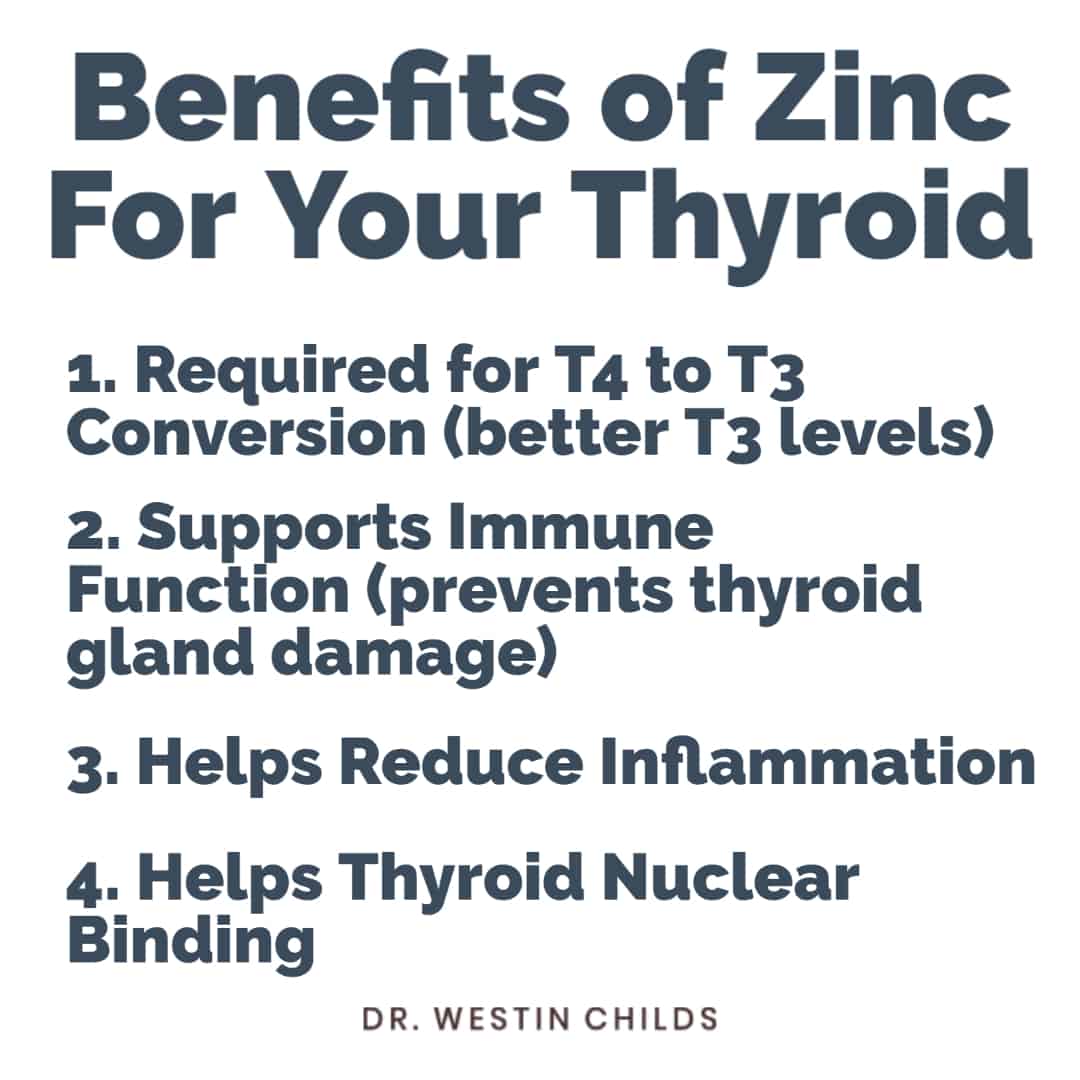
They typically don’t even think twice about it.
And while there is a test for zinc it’s so inaccurate that it might as well be useless (8).
Why is that?
Because we really don’t care about blood levels of any nutrient or hormone.
What we care about is whether or not that nutrient or hormone is inside of your CELLS because that’s where it’s doing its job.
The bloodstream is really just a highway and it’s something we use as a proxy to try and help us determine if there is enough of something.
But, you can imagine that as a proxy it’s highly inaccurate.
And this concept applies more to certain nutrients than others.
Zinc is one where it just doesn’t apply very well at all.
In fact, we have some studies showing that the gold standard for ‘testing’ for zinc deficiency is to simply provide the patient with zinc to see if they improve!
This is coming from conventional medical research which is incredibly biased AGAINST supplementation of any form.
The takeaway here is that you should NOT rely on serum zinc studies to determine if you are getting enough zinc for your thyroid or your body.
Instead, you will want to simply take zinc if you believe you are deficient (more on the symptoms below) and then track and evaluate your progress.
Symptoms you aren’t getting enough Zinc
Because you can’t trust zinc blood tests to give you 100% accurate results you should really become familiar with zinc deficiency symptoms.
The presence of these symptoms may indicate early to moderate zinc deficiency (full-blown extreme zinc deficiency is very rare in developed countries) and may indicate that you should look into supplementation with zinc.
Minor to moderate zinc deficiency symptoms include:
- Impaired immune function (getting sick more frequently than usual)
- Hair loss
- Skin problems (acne or rashes)
- Fatigue
- Mild to moderate symptoms of hypothyroidism (depending on the degree of zinc deficiency)
- Decreased appetite
- Low T3 levels
- Food allergies
- Intestinal issues
You will notice that many of these symptoms coincide with the symptoms of hypothyroidism (this is because of its direct impact on thyroid function).
In addition, you will also see that some symptoms are very nonspecific and vague (such as fatigue).
When in doubt, consider a trial of supplementation with zinc even if your symptoms are not moderate or extreme!
Zinc, as long as it is used appropriately (more info below), is very safe to use and not likely to cause any long-term issues.
How do you get Zinc?
For our purposes, zinc is really only available in two forms:
#1. Through supplementation (meaning taking an oral supplement).
And #2. Through your diet.
Each of these methods has pros and cons and you should be aware of both routes of administration.
Zinc Supplementation
We can further break down zinc supplementation into many different forms.
And not all of these forms are considered ‘equal’.
As it relates to all types of nutrients, in order for them to be absorbed and utilized by the body they must come bound to some carrier.
This carrier helps aid in absorption, helps to prevent degradation in the stomach (from acid), and helps with processing and formulating.
What you need to understand is that not all of these forms of zinc are helpful or useful.
For instance:
It’s easy to buy ‘cheap’ zinc that is bound to a low-quality carrier but using this type of zinc will NOT effectively ensure that it’s making it into your body or cells.
There are many forms of zinc but I really only recommend using the following forms for thyroid patients:
- Zinc citrate
- Zinc chelate
- Zinc monomethionine
- Zinc gluconate
- Zinc acetate
You will find that these formulations are more expensive than some forms of Zinc which may be tempting but remember that absorption is a huge issue when it comes to zinc.
These forms have medical studies which show that they are the most absorbed and, therefore, most useful especially to thyroid patients.
Zinc dosage
What about the dose?
If you are going to use zinc surely the dose matters.
I used to be a fan of using large doses of zinc (on the order of 30 mg to 60 mg per day).
I have since flipped on my stance and no longer believe that doses that high are necessary after learning that the body is limited to absorbing only around 7-10mg of zinc at any given time.
In addition, higher zinc doses may cause an upset stomach, indigestion, and even acid reflux!
So while I use to recommend higher doses I am now recommending 5 mg to 15 mg (at the most) per day for thyroid patients.
If you wish to use higher doses of zinc then it’s best to split your dose throughout the day and take your doses of zinc at least 5 hours away from each other.
Dietary Zinc (Getting Zinc from your diet)
Whether you get your zinc directly from over-the-counter supplements or from food (which we will talk about now) you should be aware that zinc is something that your body doesn’t store very well.
Unlike vitamins that are fat-soluble (vitamins A, D, E, and K) or vitamins such as vitamin B12, your body hasn’t created a system for storing zinc.
This means that what you get each day is pretty much what you use and you will need to plan to get zinc from some source each and every day.
Many people prefer to go the food route over the supplement route and I respect that.
But you should be aware that it’s not always possible to ensure that you get sustained nutrients from food due to problems such as soil depletion of specific nutrients.
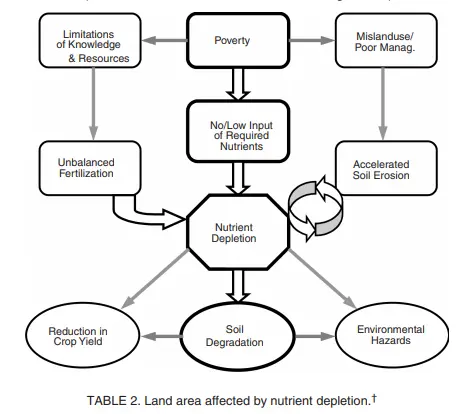
These all work to reduce the average nutritional value that food has (9) even if it is organic.
Just be aware of that.
Getting your zinc from food will also require a high degree of fidelity to a healthy lifestyle!
You can find a list of foods high in zinc (10) below:
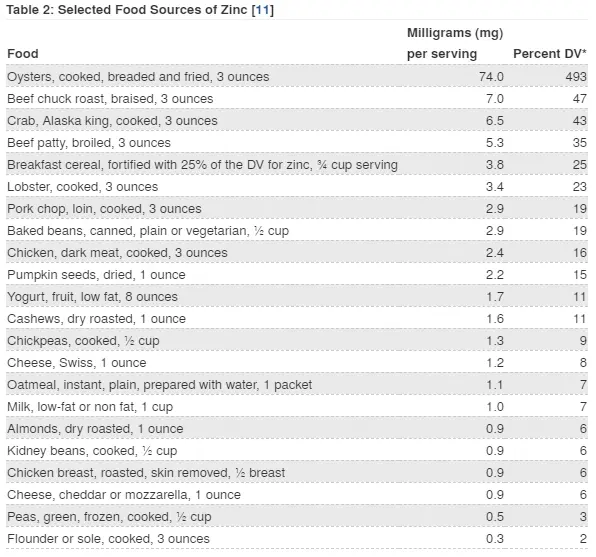
- Oysters
- Beef
- Crab
- Breakfast cereal (please don’t get your zinc from this source!)
- Lobster
- Porkchop
- Chicken
- Beans
- Yogurt
- Cashews
- Chickpeas
- Cheese (Cheddar, mozzarella, swiss)
- Oatmeal
- Milk
- Almonds
- Kidney beans
- Green peas
- Flounder
You have both animal and plant sources from the list above.
You should be aware that the zinc concentration from these food sources varies based on the quality of the food that you are eating, the type of food, how it was sourced, and how much of it you consume.
If you honestly feel that you can consume these foods each and every day then you may not need supplementation.
But my recommendation after treating thyroid patients is that most do when they use over-the-counter supplements in addition to dietary sources.
Using Zinc with Selenium
As we are discussing the use of zinc in the setting of thyroid patients we should also discuss selenium.
Selenium is another micronutrient and does very similar things to zinc in terms of its effects on the thyroid.
What’s more interesting is that people who are deficient in zinc tend to also have low selenium levels.
And it’s probably this combination of both low zinc and low selenium which facilitates a state which increases your risk of developing thyroid disease and Hashimoto’s thyroiditis.
So we really shouldn’t have a discussion about zinc without at least mentioning selenium.
Because they perform complementary roles it’s often best to supplement with BOTH of these nutrients if you decide to supplement with one.
This is really only true for thyroid patients and perhaps other groups but we are focusing on you as a thyroid patient, however.
But if you are thinking about supplementing with zinc I would strongly encourage you to also supplement with selenium.
Selenium also helps to improve T4 to T3 conversion, reduces inflammation, and helps directly halt thyroid inflammation by influencing glutathione levels.
Because of these complementary effects, I put both zinc and selenium together in all of my thyroid-specific supplements and I’ve found that patients get the best results by taking this path.
You can read more detail about how selenium impacts the thyroid (and the symptoms of selenium deficiency) in these articles.
Final Thoughts
There you have it!
Zinc is probably one of the most important if not the most important, nutrients for your thyroid.
Low levels result in problems with thyroid function which may manifest as the symptoms of hypothyroidism!
When you combine this with the fact that it’s difficult to test for zinc and that supplementing with zinc is both cost-effective and readily available, it makes using zinc a no-brainer if you have thyroid problems.
It’s one of my favorite thyroid ingredients which is why I include it in my thyroid multivitamin and T4 to T3 conversion booster.
Now I want to hear from you:
Have you tried supplementing with zinc before?
Did it help improve your thyroid?
Did you notice any difference?
Do you have any of the symptoms of zinc deficiency?
Leave your questions or comments below to keep the conversation going!
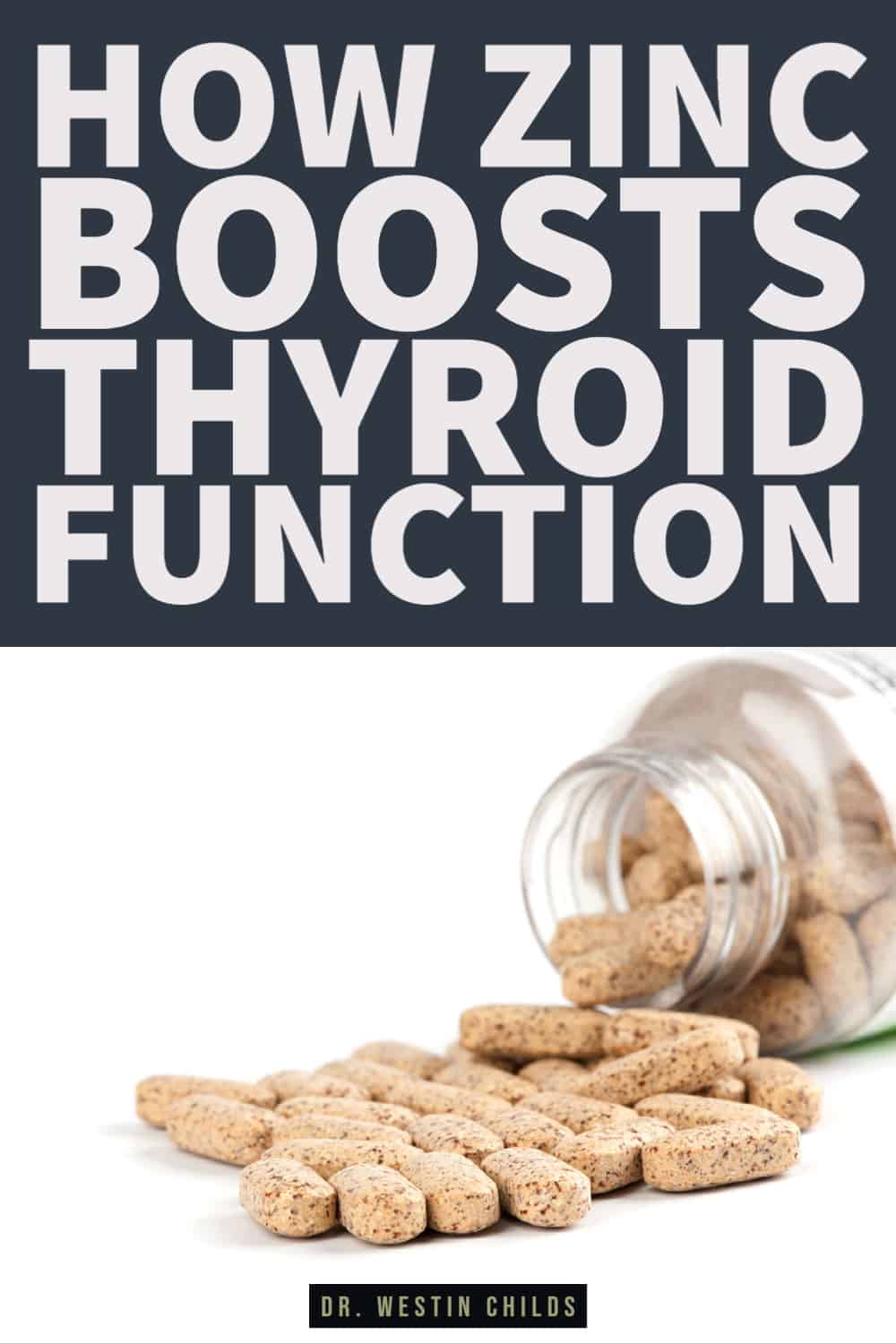
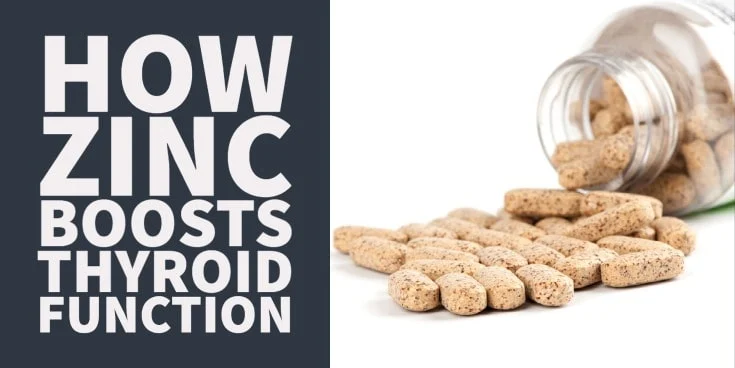

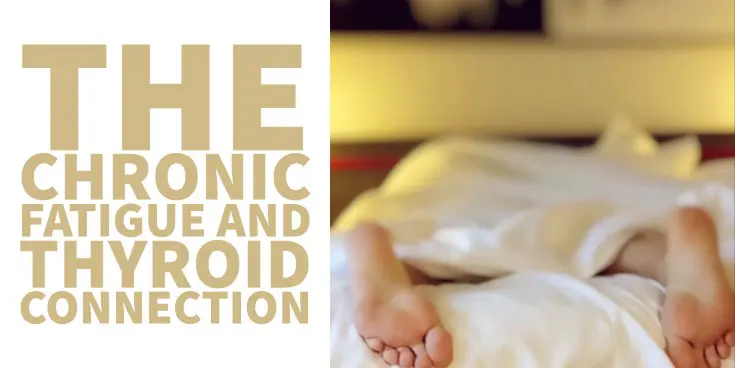
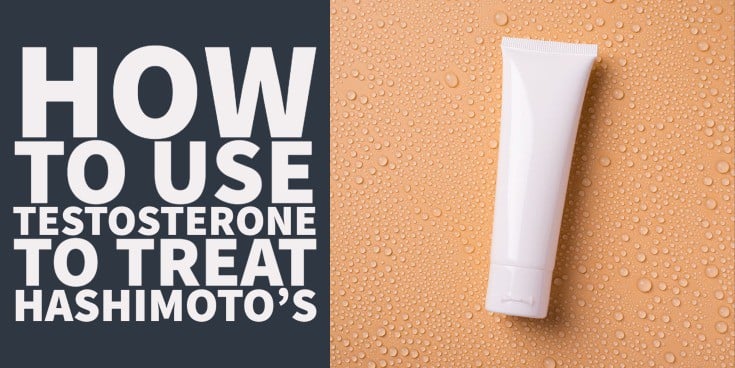
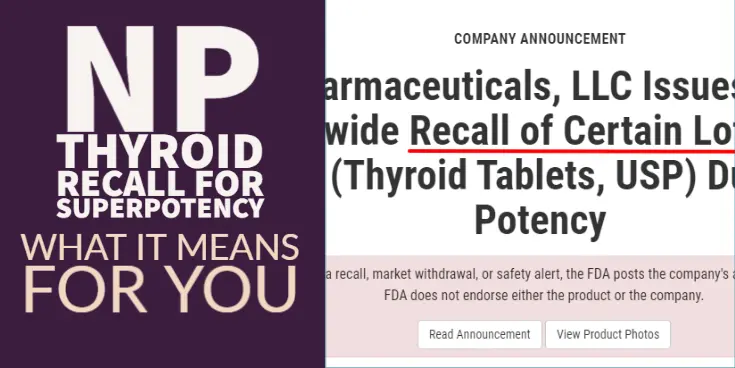
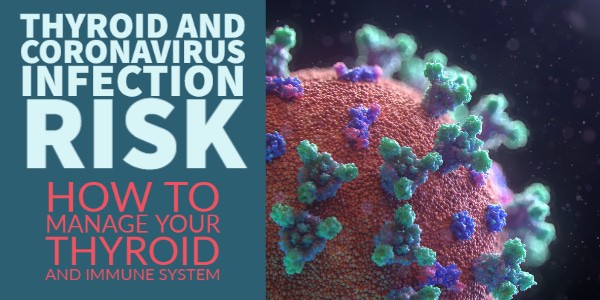
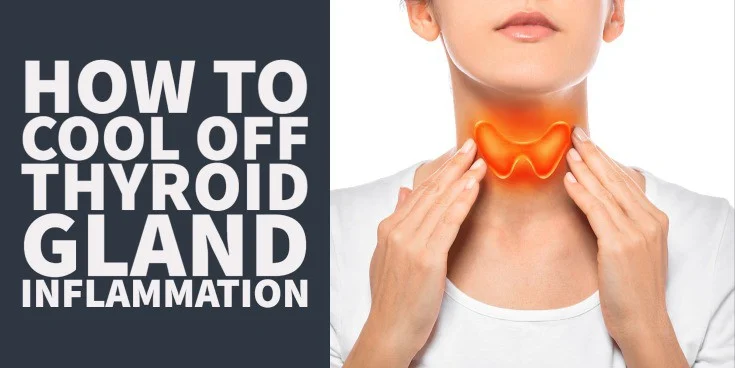
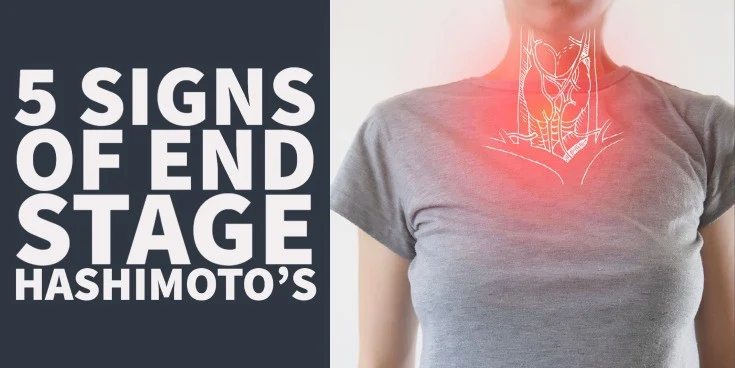

I notice my hair has thin out a lot recently but I’ve also fallen back in taking. some supplements and now I’m back on track and hoping to continue taking much needed supplements I’m also taking multi vitamin too
Hi Judy,
Thanks for sharing! Supplements can definitely help with hair regrowth 🙂
Hi Dr. Child’s,
I had surgery in September to remove a benign large tumor on the left side of my thyroid that would not stop growing. I did not have any hypo or hyper symptoms before surgery, but my last two blood panels showed significant decrease in TSH. My doctor said if I don’t take the meds it may cause KI and or HT issues. I am on 50 mcgs of levothroxine and I feel like I can cry at any given moment, I feel uneasy and very tired. Do you think I could regulate my hormone levels with zinc and selenium alone?
Thank you very much!
Do you recommend liquid or pill form? Also, are all the daily essential supplements and vitamins included in the weight-loss bundle pack? Or do I need to purchase the daily essential supplements and vitamins also?
Hi Bryn,
If you are talking about zinc you definitely don’t need a liquid formulation. In terms of the nutrients for thyroid function, they are all found in the thyroid daily essentials (by itself) or in the weight loss bundle (provided you use ALL of the supplements in that bundle).
how do i take zinc with my every day levoxyl . do I take zinc with it or wait four hours after taking levoxyl
Hello Dr.Child’s,
Two questions :
1-Which zinc do you recommend for people without a thyroid?
2- My 21 year old daughter was just diagnosed with Hashimoto- she’s taking selenium. I want to know which zinc to order get her. She’s not taking any meds.
Thank You-
Good day Doctor Childs
I am a 73 years old and female. I recently had the right lobe of my thyroid removed, and it turned out I had stage 1 cancer. I now have to have regular blood tests, to make sure the remaining lobe is coping. I haven’t received any advice regarding diet, and would welcome your input, or any direction you can offer me to help my remaining lobe performs at optimum level.
Kind regards
Sue Rademeyer
Hi Sue,
I would check out this article for more info on foods you should be avoiding! https://www.restartmed.com/thyroid-foods-to-avoid/
I am a 55 year old female that had total thyroid removed 18 months ago. I am taking 137 mcg Levothyroxine and am still experiencing hair loss, joint/muscle pain, fatigue and weight gain. My endocrinologist says all levels are within “normal” range, despite continuing symptoms. Should I be supplementing with zinc and sellinium?
Find a functional medicine doctor and dump your endocrinologist. It took me 15 years of misery to learn that lesson. Then sit down with a new notebook and visit Dr Childs’ website. Take copious notes. You will know more than your endocrinologist in a few hours. And you can take your notes to a functional med doctor who will actually care how you feel, not what the chemistry says. Good luck.
Amen, she is so right! dump your endo!!! I got better when I did!
Hello Doctor,
I am Kay and I have goiter since about 13 years. I did not get it operated due to fear, but especially since it drains from time to time. But it never went away totally. It keeps getting filled. I have not taken any treatment for this but do you think it would go away if I took care of the deficiencies like zinc and selenium?
I love Dr Child’s thyroid blog and want to share my experience with zinc deficiency. I have a genetic mutation that eats up zinc faster than most people. While underfed as a child (less than 300 calories a day), I regularly felt a lack of hunger and thought I was eating a lot when I increased my food intake to 1000 calories per day in junior high school on the encouragement of my schoolmates. After graduating with my Master’s, I used my first independent source of income to hire the (now retired) head of the Alliance for Natural Health USA as my integrative medicine doctor. She ran comprehensive nutrient tests on my blood and showed me that I was low on every B vitamin, amino acid, fatty acid and mineral due to a few months of adopting a raw vegan diet. When I first started zinc picolinate (30 mg), it gave me diarrhea even though I needed it. She decreased it to 15 mg and I could tolerate it.
She diagnosed a food allergy to gluten and intolerance to rice and soy. Once I stopped eating gluten, my seasonal eczema cleared up. The supplements she prescribed (including selenium and iron) helped. My hair grew well but shows graying at the roots. I still felt full on relatively full on the prescribed high fat, high protein diet with relatively little food because of digestion issues. My tongue had a constant white coating, which resolved itself this year when I started taking digestive enzymes with each meal.
The comprehensive thyroid panel looked okay, except for high Reverse T3. She said it was okay – she would have known that calorie restriction causes that. I was (and still am) physically small, of shorter height and looked like a freshman in high school when I graduated. Now I look like a college student.
I’m taking the T3 Conversion Booster and a protein powder similar to Functional Fuel Detox. I stopped the Thyroid Adrenal complex for a couple of weeks to get accurate Organic Acids Test results due to the L-Tyrosine interference. I think the supplements cut my bleeding duration during my menstrual cycle by half. My ferritin is still low and causes intermittent fatigue.
Hi Jordan,
Thanks for sharing your story! It’s so helpful for others who are struggling.
Hello,
I’m curious as to if you think the zinc tally test has merit. This involved swallowing a capful of liquid zinc sulfate, then determining if/when you taste a metallic flavor. If you taste the metal, you are not deficient. If it is delayed, you are mildly deficient. If it tastes like water, very deficient. Is this legitimate in your view?
Hi Sharon,
And nah, I wouldn’t recommend that test. There are too many issues when trying to use tests based on subjective results like taste. There’s virtually no harm in supplementing with zinc so that’s often the best way to test for deficiency.
I have a 9 year old daughter that has been diagnosed with hypothyroid and is on NP thyroid medication, but still suffers from some of her symptoms. I am wanting to try some supplements to help boost her thyroid so that it functions better for her. Is there a dosage or a good children’s zinc and selenium supplement that i could try for her?
I have hyperthyroidism. Would you still recommend zinc and selenium for me?
Great blog, doctor. I have the same question as Betsy. I recently have developed hyperthyroidism, and have lost a lot of kilos. Are zinc and selenium recommended? If not, then what is that that we should take. Thanks!
Hey childs, my TPO is high, other hormon levels are normal. I want to reduce it, after reading your article l have been using selenium tablet 200 mg every day since last 3 month, l wonder when l need to give a break? Or l need to use all year around? And l bought burdock supplement and Pycnogenol but l don’t know what hours l need to take, thank you dr, your all information helped me a lot.
Hi
I’m living in the U.K. and would really like Dr Westin Child’s advice. After reading many of his articles my endocrinologist has put me on a combination T4 and T3 which has been a life changer in how I feel.
My main concern is that I have considerable hair loss which my dermatologist saying is female pattern baldness. I don’t agree as I feel it’s hormone related. Does Doctor Child’s offer a service where he can advise me which supplements to take if I provide requested blood tests. I’m taking taking supplements that are suggested but they’re not making a difference. I also suffer with allergies, mouth blood blisters, IBS which I control using the Fodmap diet. I desperately need his help. I’m 57 and I keep myself fit with regular Pilates and yoga.
Obviously I’d pay for Such a service?
Hello Dr Childs, I have Hashimoto’s thyroiditis, my T3 and T4 are on acceptable levels and don’t need to be medicated with Thyroxine yet. I have some questions please:
– can I pair ( take together) the Zinc Picolinate With Selenium ( as L- selenomethionine), and does it make a difference on empty stomach or after meals?
– I’m also taking Magnesium, vitamin D, And vitamin K and really confused about taking them all together or should I separate each during the day?
Thank you
I have been working with a naturopath who took me off of zinc, selenium, and Vit c as he believes these are immune boosters and will increase the attack on the thyroid ( I have Hashi’s). He says the goal is to tamp down the immune response not increase it? My medical doctor disagrees…after reading this I am more confused? Any thoughts?
Dear Childs,
Thank you so much for your endearing support .
Since i started supplementing with zinc and selenium, my thyroid profile has really improved and most symptoms including fatigue have all cleared. I feel energetic and my daily are more productive.
This information has just confirmed that zinc and selenium are deficient in most of population and supplementation for thyroid health very critical.
Regards
Hi Dr Child’s,
I have had a complete thyroidectomy almost 2 year’s ago. The test results say my T4 & T 3 are normal or high. Yet I still have hypothetical symptoms. Would it be advisable to take a zinc and selenium supplement. Will it help with the symptoms or should it?
Dr. Child’s,
Thank you so much for your time in sharing this amazing insight! Please help…. I am post total thyroidectomy and total hysterectomy 3 years now. I am 46. I’m on 125 mg of Levothoraxine. I take selenium daily and a zinc, mag and calcium suppliement daily. My hair has thinned to the point of almost balding on top (all across the top of my head now). I lose hair daily. I even use WEN… I also take Andrew Lesman hair skin and nails additionally as well and also L-glutathione daily. My endo doesn’t feel my dosage is off. I also have several auto immune conditions since this all began 15 years ago. I’m extremely fatigued no matter how much rest I get and am often experiencing auto immune flares (AS and RA). I do keep a full time career afloat as well as minister in music at the church. Can you please advise what I can do for this hair loss? I’m so concerned. I almost can’t blend the scalp anylonger with hair powders. (Which i use sparingly to try to evade clogging the scalp.) Thank you so much for your time and thoughts.
Blessings,
Jennifer
All very convincing information, but I’ve attempted to supplement with many types of zinc including citrate and glycinate and it makes me feel incredibly sick to my stomach. Almost instantly after supplementation I feel nauseous, even as they merely touch my tongue. At times when I’ve taken higher doses for immune support, I have vomited. I’ve been told that this probably means that I am not deficient?
Hi Teresa,
Not at all, more likely it just means you are trying to take too much at once. Zinc can be hard on the stomach.
What are your thoughts on Zinc Acetate for thyroid patients? I read that it’s potent. I also just ran lab work on zinc so I’m waiting on results. Thanks!
Hi Heidi,
Zinc citrate, sulfate, acetate, and gluconate are all good alternatives.
Hi Dr. Childs,
None of the aforementioned forms of Zinc are available at the health store I buy from. There’s Zinc Glycinate for men & prostate health, L-OptiZinc, Zinc Picolinate, Pure Albion Zinc & Chelated Zinc. Which do I get?
Hi Heidi,
Match the zinc to the formulations found in my products:
https://www.restartmed.com/product/thyroid-daily-essentials-thyroid-multivitamin/
https://www.restartmed.com/product/t3-conversion-booster/
Source for the maximum absorption of zinc you mention? Thanks.
Hi JKU,
It’s been a while since I wrote this article but I remember finding it buried in an article about small intestinal physiology. As I recall, the study wasn’t specifically about zinc but about various nutrients and their absorption rate in the duodenum, jejunum, and ileum. I don’t have the source off hand but if I run into it again I’ll post it.